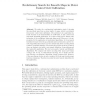Free Online Productivity Tools
i2Speak
i2Symbol
i2OCR
iTex2Img
iWeb2Print
iWeb2Shot
i2Type
iPdf2Split
iPdf2Merge
i2Bopomofo
i2Arabic
i2Style
i2Image
i2PDF
iLatex2Rtf
Sci2ools
110
click to vote
SAGA
2001
Springer
2001
Springer
Evolutionary Search for Smooth Maps in Motor Control Unit Calibration
We study the combinatorial optimization task of choosing the smoothest map from a given family of maps, which is motivated from motor control unit calibration. The problem is of a particular interest because of its characteristics: it is NP-hard, it has a direct and important industrial application, it is easy-to-state and it shares some properties of the wellknown Ising spin glass model. Moreover, it is appropriate for the application of randomized algorithms: for local search heuristics because of its strong 2-dimensional local structure, and for Genetic Algorithms since there is a very natural and direct encoding which results in a variable alphabet. We present the problem from two points of abstract view with a very simple definition of smoothness and the real-world application. We run local search, Genetic and Memetic Algorithms. We compare the direct encoding with unary and binary codings, and we try a 2-dimensional encoding. For a simple smoothness criterion, the Memetic Algori...
| Added | 30 Jul 2010 |
| Updated | 30 Jul 2010 |
| Type | Conference |
| Year | 2001 |
| Where | SAGA |
| Authors | Jan Poland, Kosmas Knödler, Alexander Mitterer, Thomas Fleischhauer, Frank Zuber-Goos, Andreas Zell |
Comments (0)

